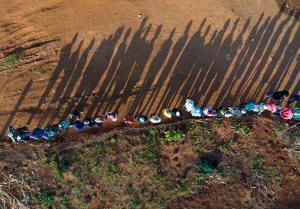Early results in South Africa's election show ANC losing majority
 Send a link to a friend
Send a link to a friend
 [May 30, 2024]
By Kopano Gumbi, Tannur Anders [May 30, 2024]
By Kopano Gumbi, Tannur Anders
MIDRAND, South Africa (Reuters) -The African National Congress appeared
on course to lose the parliamentary majority it has held for 30 years,
partial results from South Africa's national election showed, in what
would be the most dramatic political shift since the end of apartheid.
If the final results confirm the loss of its majority, the ANC will be
forced to make a deal with one or more other parties to govern - a
situation that could lead to unprecedented political volatility in the
coming weeks or months.
"There will be checks and balances on the ANC power, but the ultimate
risk is that the infighting could make governance ineffective," said
Simon Harvey, head of foreign exchange analysis at Monex Europe.
With results in from 16.7% of polling stations, the ANC's share of the
vote in Wednesday's election stood at 42.5%, with the pro-business
Democratic Alliance (DA) on 25.8%, data from the electoral commission
showed on Thursday.
The Marxist Economic Freedom Fighters (EFF) party was on 8.5%, while
uMkhonto we Sizwe (MK), a new party led by former president Jacob Zuma,
was snapping at its heels on 8%.
"I don't think it's likely for the ANC to reach a majority," said
pollster Reza Omar of Citizen Surveys, noting that while the picture
would evolve, it was unlikely to change to that extent.
South African broadcaster eNCA projected that the ANC's final score
would land on the 45% mark while the DA would remain the largest
opposition party on 21%.

"The ANC looks forward to a clear mandate from voters to continue the
work of transforming South Africa and building a better life for all,"
the party said in a statement.
Tessa Dooms, director of the Rivonia Circle think-tank in Johannesburg,
said the early results were skewed towards rural areas where she would
have expected the ANC to be performing more strongly than it was.
"The rural vote comes in early and it's always much smaller. The urban
vote comes in quite late. I think this election will be a lot more
contested in the urban areas," she told Reuters at the results centre in
Midrand, north of Johannesburg.
Under South Africa's constitution, the newly elected National Assembly
will elect the next president. With the ANC still on course to be the
largest party, that is likely to be its leader Cyril Ramaphosa, the
incumbent.
However, a poor showing could make him vulnerable to a leadership
challenge from within party ranks, whether in the immediate future or at
some point during his term.
With South Africa entering uncharted political territory, Harvey said
the speed at which a coalition could be formed would be an indication of
what was to come.
"If it is protracted, you may start to worry about a political gridlock
going forward," he said.
The uncertainty weighed on South African markets.
The rand slipped more than 1% against the U.S. dollar to hit its weakest
level in four weeks while the wider equity index dropped more than 2% in
its worst day in six weeks. The country's international bonds lost as
much as 1 cent in the dollar.
[to top of second column]
|

A drone view shows people queue at the Hospital Hill township to
vote during the South African elections, in Johannesburg, South
Africa May 29, 2024. REUTERS/Ihsaan Haffejee/File Photo

THE ZUMA FACTOR
The ANC has won national elections held every five years since the
landmark 1994 election, which marked the end of apartheid and the
ascent of Nelson Mandela as president.
But since those heady days the ANC's support has declined because of
disillusionment over issues such as high unemployment and crime,
frequent power blackouts and corruption.
In the previous election in 2019, the ANC won 57.5% of the vote,
with 20.8% for the DA and 10.8% for the EFF, on a turnout of 66% of
registered voters, which the commission has already said is likely
to be higher this time.
At provincial level, the early results showed the ANC on 35.7%, the
DA on 29.6%% and the EFF on 10.8% in the key province of Gauteng,
which includes the country's business capital Johannesburg and the
sprawling townships of Soweto and Alexandra.
In KwaZulu-Natal, a populous eastern province where the major city
of Durban is located, Zuma's MK was performing strongly, with 43.2%
of the vote versus 21.7% for the ANC. KwaZulu-Natal is his home
province and he is popular there.
Zuma was forced to quit as president in 2018 after a string of
scandals and has since fallen out with the ANC leadership, leading
him to throw his weight behind MK. The party, named after the ANC's
armed wing from the apartheid era, appeared to be costing both the
ANC and the EFF votes.
"MK is going to be a real player. That it tracks close to the EFF is
significant because they are going after the same voters," said
Dooms.
By law, the electoral commission has seven days to declare full
results, but in practice it is usually faster than that. In the last
election, in 2019, voting took place on a Wednesday like this year
and final results came on the Saturday.
The new parliament must convene within 14 days of final results
being declared and its first act must be to elect the nation's
president.
This means that if the ANC is confirmed to have lost its majority
there could be two weeks of intense and complex negotiations to
agree on how to form a new government.
(Additional reporting by Bhargav Acharya, Alexander Winning, Nellie
Peyton, Bate Felix, Tannur Anders, Sruthi Shankar and Karin
Strohecker; Writing by Estelle ShirbonEditing by Gareth Jones,
Emelia Sithole-Matarise and Toby Chopra)
[© 2024 Thomson Reuters. All rights reserved.]This material
may not be published, broadcast, rewritten or redistributed.
Thompson Reuters is solely responsible for this content.
 |